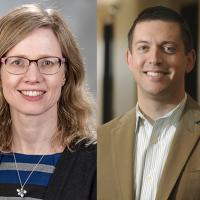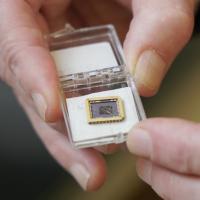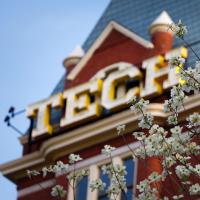Machine learning (ML) has transformed the digital landscape with its unprecedented ability to automate complex tasks and improve decision-making processes. However, many organizations, including the U.S. Department of Defense (DoD), still rely on time-consuming methods for developing and testing machine learning models, which can create strategic…
Four faculty members have been selected for the second cohort of the Faculty Executive Leadership Academy (FELA) program, which is designed to identify and develop senior faculty members for leadership. The new cohort includes: David Ballantyne, Professor and Associate Chair for Academic Programs, School of Physics …
In 1950, Alan Turing asked, “Can machines think?” More than 70 years later, advancements in artificial intelligence are creating exciting possibilities and questions about its potential pitfalls. A recent executive order issued by President Joe Biden seeks to establish "new standards for AI safety and security" while addressing consumer…
You may be familiar with yeast as the organism content to turn carbs into products like bread and beer when left to ferment in the dark. In these cases, exposure to light can hinder or even spoil the process. In a new study published in Current Biology, researchers in Georgia Tech’s School of Biological Sciences have engineered one of the…
Researchers at the Georgia Institute of Technology have created the world’s first functional semiconductor made from graphene, a single sheet of carbon atoms held together by the strongest bonds known. Semiconductors, which are materials that conduct electricity under specific conditions, are foundational components of electronic devices. The team…
Three GTRI researchers made it to the finals and came home with second place in the "Southeastern Cyber Cup" competition, a multi-day, national-level, higher education competition and cyber hacking event held last month. The three researchers are Justin Hsu, Garrett Brown, and Drew Petry. Their team, named the "Clockcycles," was one of the 15…
While quantum computing is still in its early stages, it has the power to unlock unprecedented speed and efficiency in solving complex computational fluid dynamics (CFD) problems that could revolutionize several industries, including the defense space. The Georgia Tech Research Institute (GTRI) and Georgia Institute of Technology (Georgia…
Africa is on fire. It has been for thousands of years. The continent contains more than 50% of the total area on Earth that is burning, on average, and there is no sign of it stopping — indeed, the migrating, hemisphere-hopping African wildfire season is steadily increasing.The fire is essentially feeding itself in a kind of feedback loop as…
Georgia Tech engineers are working to make fertilizer more sustainable — from production to productive reuse of the runoff after application — and a pair of new studies is offering promising avenues at both ends of the process.In one paper, researchers have unraveled how nitrogen, water, carbon, and light can interact with a catalyst to produce…
Mo Li, professor in the School of Materials Science and Engineering at Georgia Tech, has received the Humboldt Research Award from the Alexander von Humboldt Foundation. The award honors internationally leading researchers in recognition of their entire academic record to date.The Humboldt recipients are academics whose fundamental discoveries,…













